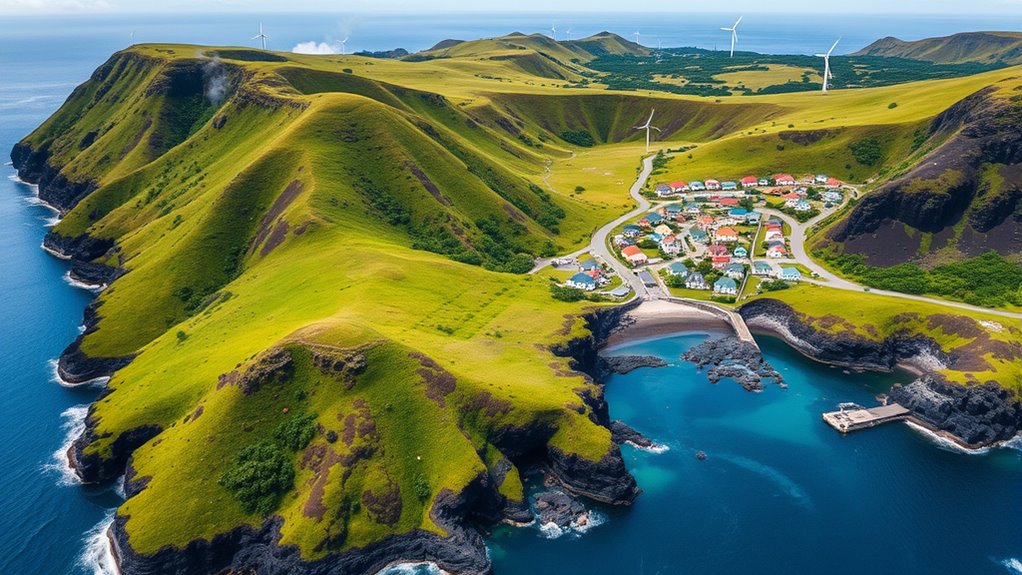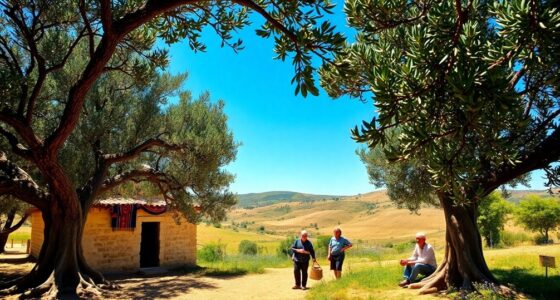The Azores are a shining example of Europe’s sustainable archipelago. You’ll find natural landscapes and biodiversity protected through strict regulations and eco-friendly farming. Marine ecosystems thrive thanks to protected areas, coral restoration, and responsible tourism. Green accommodations and sustainable transportation help reduce your carbon footprint. You can also experience rich local culture and community-driven conservation efforts. To uncover how this beautiful island group balances tourism with environmental preservation, explore more about their innovative practices.
Key Takeaways
- The Azores prioritize biodiversity conservation through protected areas, eco-friendly farming, and sustainable land management practices.
- Marine ecosystems are safeguarded via coral reef restoration, marine pollution control, and responsible coastal tourism.
- The archipelago promotes sustainable tourism with eco-friendly accommodations, renewable energy use, and low-impact activities.
- Local cultural traditions are preserved through artisan crafts, festivals, and community-led environmental initiatives.
- Future sustainability efforts focus on renewable energy expansion, waste reduction, and community engagement for ecological resilience.
Preserving Natural Landscapes and Biodiversity

Because preserving natural landscapes and biodiversity is essential to the Azores’ unique environment, efforts to protect these areas are a top priority. You’ll find that sustainable agricultural practices play a vital role in maintaining native ecosystems, avoiding harmful chemicals, and promoting soil health. These practices help reduce the impact of farming on local wildlife and landscapes. Meanwhile, urban development is carefully managed to prevent encroachment on protected areas. Authorities enforce strict regulations to limit construction near natural reserves, ensuring that expansion doesn’t threaten biodiversity. By balancing agricultural needs with responsible urban planning, the Azores actively safeguard its landscapes. Implementing vetted environmentally friendly farming methods further supports these conservation goals. Your visit supports these efforts, as eco-conscious choices contribute to preserving the archipelago’s rich biodiversity and pristine natural beauty for future generations.
Eco-friendly Accommodation and Hospitality Initiatives
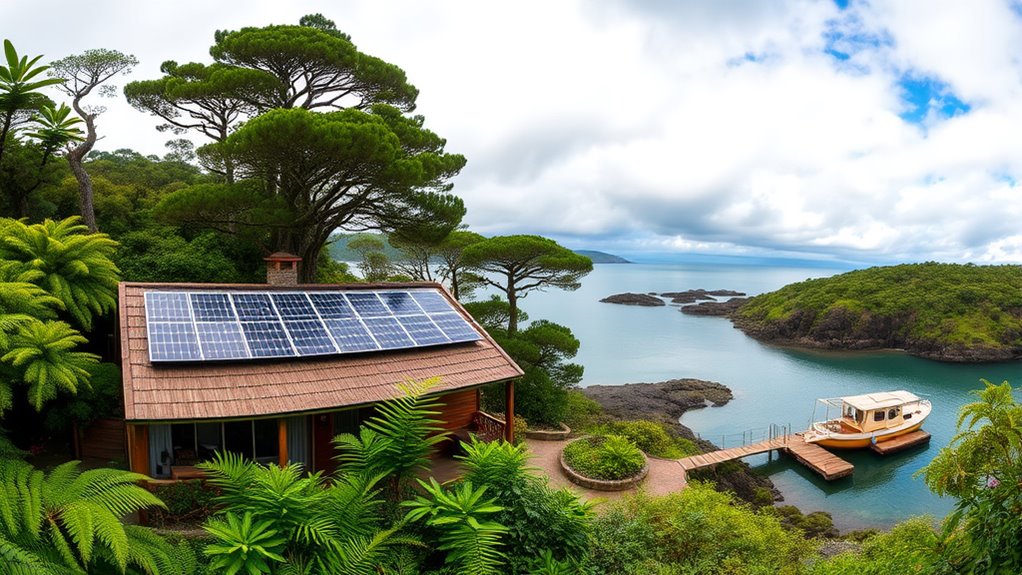
Many accommodations in the Azores are adopting green lodging practices to reduce their environmental impact. Sustainable hospitality programs are becoming more common, encouraging eco-conscious choices for travelers. By choosing these options, you can enjoy the islands while supporting their natural preservation. Incorporating eco-friendly practices like using renewable energy sources and responsible waste management further enhances the sustainability of these accommodations.
Green Lodging Practices
Have you noticed how more accommodations in the Azores are adopting eco-friendly practices? They’re embracing green lodging to protect this beautiful archipelago. Many now harness solar energy to power their facilities, reducing reliance on fossil fuels and lowering carbon footprints. They also prioritize waste reduction by composting, recycling, and minimizing single-use plastics, making a real difference. These efforts create a welcoming atmosphere where your stay supports sustainability. You’ll feel good knowing your visit helps preserve the islands’ natural beauty and resources. Such initiatives foster a deep connection with the environment while offering comfort and authenticity. The Azores’ commitment to green lodging proves that responsible tourism can be both impactful and enjoyable for travelers like you. Incorporating renewable energy sources further enhances their sustainability efforts and demonstrates a dedication to environmental stewardship.
Sustainable Hospitality Programs
The Azores are increasingly embracing sustainable hospitality programs that highlight eco-friendly accommodation and innovative initiatives. Many hotels and lodges now meet strict eco labeling standards, ensuring they follow environmentally responsible practices. These establishments prioritize waste reduction strategies, such as composting, recycling, and minimizing single-use plastics, to lessen their ecological footprint. You’ll find resorts that incorporate renewable energy sources like solar and wind power, further supporting sustainability efforts. Local operators are also offering eco-conscious services, from farm-to-table dining to nature-based activities that promote conservation. By choosing these accommodations, you actively contribute to preserving the islands’ natural beauty and biodiversity. Implementing water-saving techniques is also a key component of their sustainability strategies, helping to conserve vital resources. These initiatives demonstrate the Azores’ commitment to sustainable tourism, allowing you to enjoy a memorable, eco-friendly experience.
Sustainable Transportation Options for Travelers

Are you looking for eco-friendly ways to explore the Azores? You’ll find plenty of sustainable transportation options that let you enjoy the islands responsibly. Rent an electric scooter for a fun, emission-free ride through charming towns. Opt for bike rentals to immerse yourself in the breathtaking landscapes at your own pace. Both options reduce your carbon footprint and keep the environment pristine. Imagine zipping along coastal paths, feeling the fresh air, and discovering hidden spots away from crowded tourist areas. These eco-friendly choices make your adventure more meaningful and sustainable. With simple, guilt-free transportation, you get to connect deeply with the islands’ natural beauty while supporting their commitment to environmental preservation. Incorporating electric vehicle options into your travel plans can further enhance your eco-friendly experience. Your journey becomes part of the Azores’ sustainable story.
Promoting Local Culture and Traditional Practices
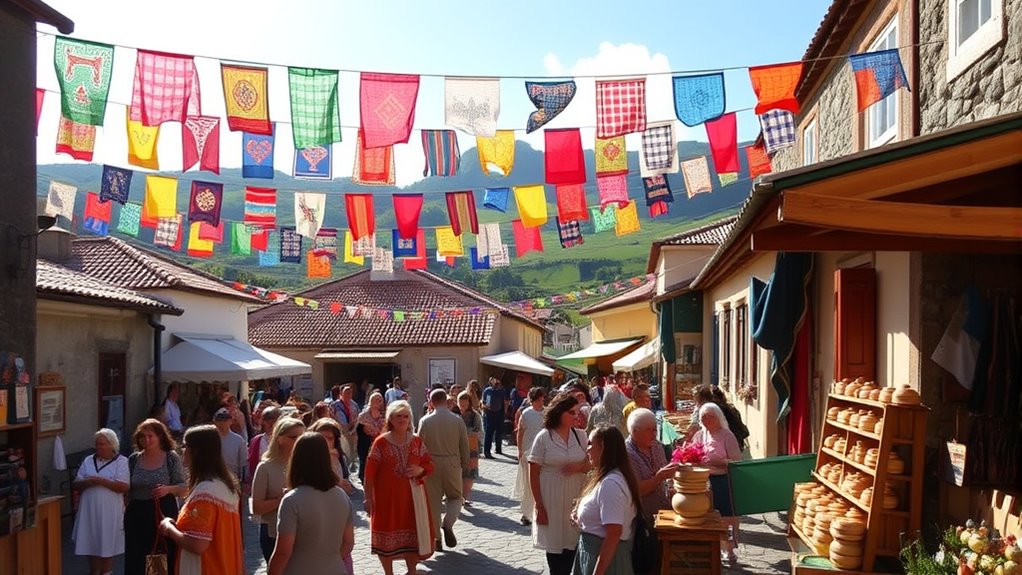
To truly experience the Azores, engaging with local culture and traditional practices is essential. You can explore local artisan crafts, where skilled artisans create unique ceramics, embroidery, and woodwork that reflect the islands’ heritage. Participating in traditional festivals offers an immersive glimpse into Azorean life, from lively music and dance to authentic food and customs. Attending these celebrations allows you to connect directly with residents, preserving and promoting their cultural identity. Supporting local artisans and taking part in festivals helps sustain these traditions for future generations. Additionally, understanding the divorce process in various states can provide insight into how different regions handle family and legal matters, reflecting broader societal values. By embracing these practices, you not only enrich your visit but also contribute to the preservation of the Azores’ vibrant cultural legacy in a sustainable way.
Responsible Marine and Coastal Tourism
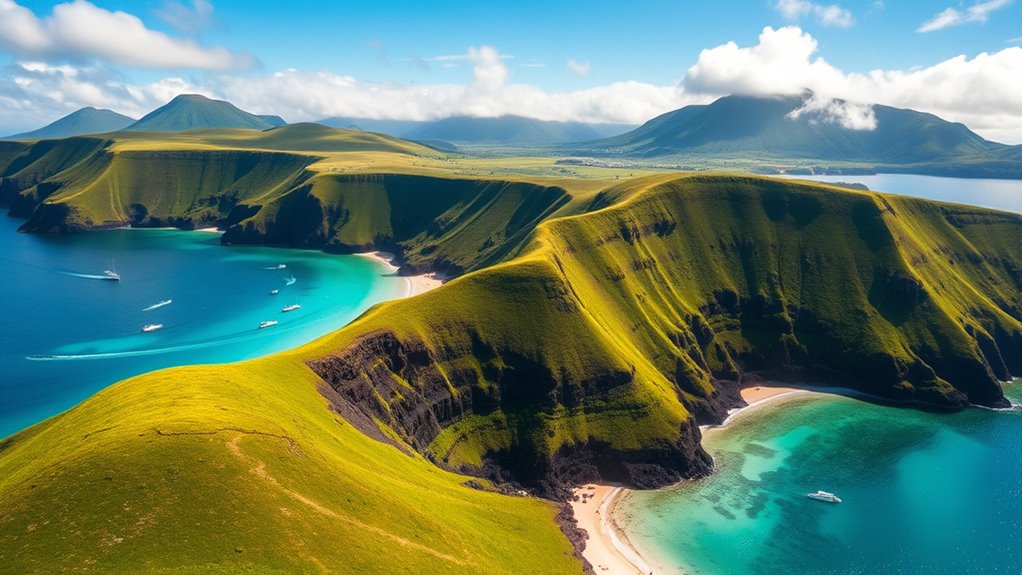
Engaging with local culture and traditions naturally leads to a greater appreciation for the Azores’ natural environment, especially its marine and coastal areas. By practicing responsible marine and coastal tourism, you help protect delicate ecosystems and support marine conservation efforts. Respect maritime wildlife, avoid disturbing nesting sites, and choose eco-friendly tour operators committed to sustainable practices. Your actions directly contribute to maintaining coastal resilience, ensuring the islands’ shores and waters remain vibrant for future generations. Incorporating color accuracy considerations into your exploration can enhance your visual experience and deepen your connection with the island’s breathtaking scenery.
- Witness dolphins and whales in their natural habitat, knowing your presence supports marine health
- Respect fishing communities by following sustainable guidelines
- Participate in eco-conscious water sports that minimize environmental impact
- Support local businesses that prioritize conservation and responsible tourism
Conservation Projects and Protected Areas
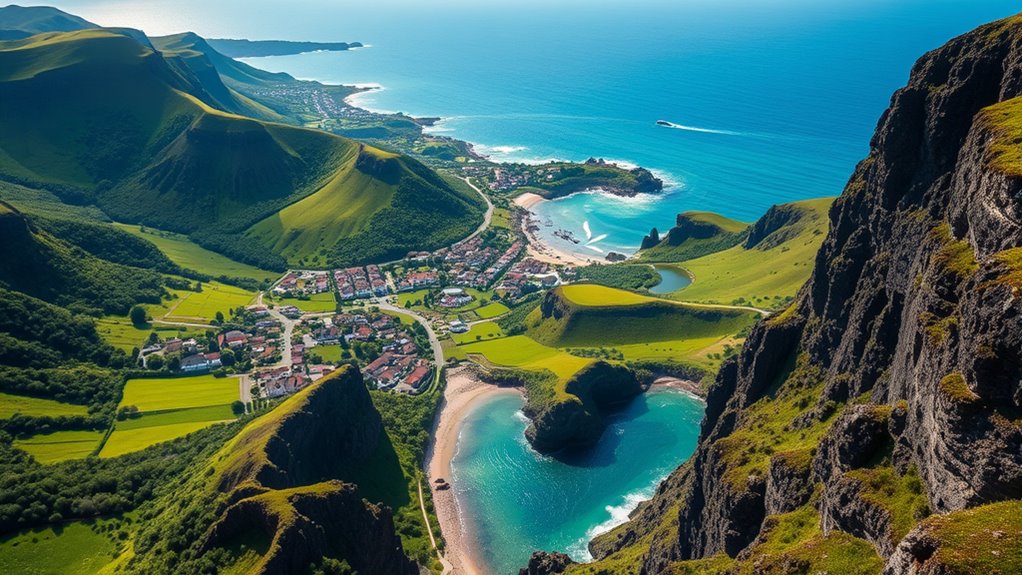
You can explore how conservation projects in the Azores protect both marine life and land habitats. These efforts aim to preserve the unique biodiversity that makes the islands special. Understanding these safeguards helps you appreciate the ongoing commitment to environmental preservation. Promoting sustainable agricultural practices further supports the health and resilience of local ecosystems.
Marine Life Preservation
The Azores have implemented several conservation projects and established protected areas to safeguard their rich marine ecosystems. You can witness efforts like coral reef restoration, which helps revive fragile habitats and supports diverse species. Marine pollution control initiatives aim to reduce plastics and contaminants, ensuring cleaner waters for marine life. These projects protect species like dolphins, whales, and seabirds, maintaining the archipelago’s vibrant biodiversity. You’ll feel inspired by the community’s dedication to preserving these waters for future generations.
- Witness thriving coral reefs reborn through restoration efforts
- See clear waters teeming with playful dolphins and majestic whales
- Feel connected to a region committed to marine health and sustainability
- Experience the joy of discovering pristine, protected habitats
- Ongoing conservation projects demonstrate the region’s proactive approach to environmental stewardship
Land and Habitat Safeguards
Building on the efforts to protect marine life, the Azores also prioritize land and habitat preservation through a network of conservation projects and protected areas. These initiatives aim to manage land use sustainably and restore habitats damaged by agriculture or development. Protected zones like the São Jorge Natural Park showcase successful habitat restoration, ensuring native species thrive. You’ll find that land use policies balance human activity with conservation needs, safeguarding biodiversity. The Azores’ approach emphasizes collaboration between government, scientists, and local communities to maintain ecological integrity. Additionally, the implementation of exfoliation techniques in land management contributes to healthier ecosystems and resilient habitats.
Community Engagement and Eco-conscious Activities
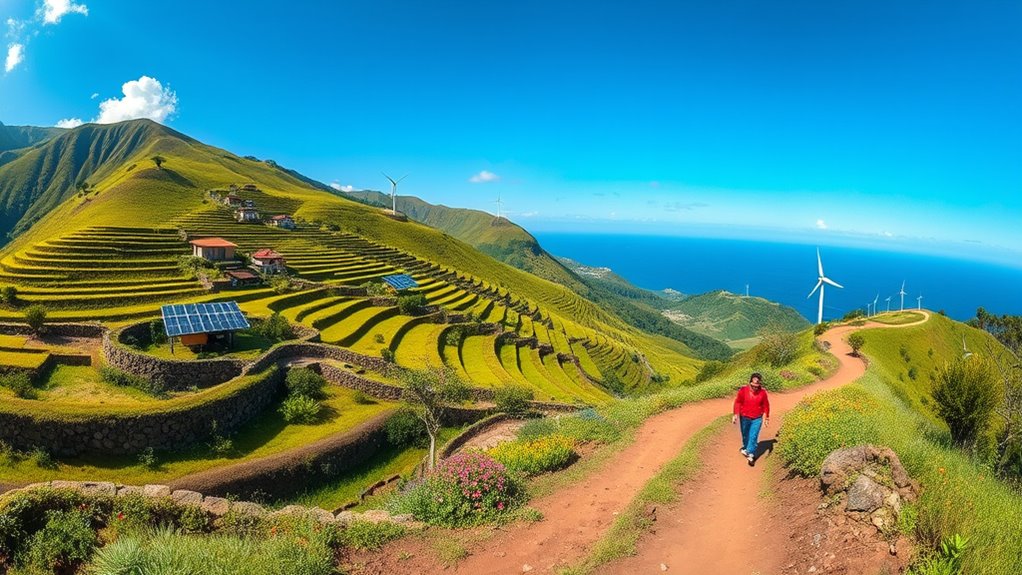
Community engagement and eco-conscious activities thrive in The Azores, reflecting residents’ commitment to preserving their unique environment. You’ll notice locals actively participating in community-led initiatives that promote sustainability, such as beach clean-ups and reforestation projects. Eco education programs are widespread, inviting visitors and residents alike to learn about conserving this delicate ecosystem. These efforts foster a shared sense of responsibility, making everyone part of the archipelago’s green future. When you explore the islands, you’ll see firsthand how passionate communities work together to protect their home. This collective spirit creates a powerful connection to the land and sea, inspiring you to embrace eco-friendly practices during your visit.
- Join local beach clean-up days and see the impact firsthand
- Participate in eco education programs to deepen your understanding
- Support community-led initiatives that protect native habitats
- Feel the pride of a shared commitment to sustainability
Challenges and Future Prospects in Sustainability

What are the biggest hurdles facing the Azores’ efforts to achieve long-term sustainability? One major challenge is balancing the region’s reliance on renewable energy with its growing demand. While wind, solar, and geothermal sources are promising, expanding infrastructure and storage capacity remains complex. Waste management also poses difficulties, as waste generation increases with tourism and population growth. Efficient recycling programs and waste reduction strategies are essential but require investment and community participation. Additionally, preserving the archipelago’s unique ecosystems while developing sustainable industries can be tricky. Future prospects depend on your commitment to advancing renewable energy projects, improving waste management systems, and fostering eco-conscious practices. Overcoming these hurdles ensures the Azores can maintain its status as a model for sustainable living in Europe.
Frequently Asked Questions
How Does the Azores Manage Waste and Recycling Sustainably?
You can see how the Azores manage waste and recycling sustainably through their waste reduction and recycling initiatives. They actively promote separating waste at the source, encouraging residents and visitors to minimize waste. The islands also implement innovative recycling programs, turning waste into useful resources, and invest in eco-friendly disposal methods. These efforts help protect the environment, reduce landfill use, and promote a greener, more sustainable lifestyle across the archipelago.
What Renewable Energy Sources Are Most Utilized in the Archipelago?
You’ll find that the Azores primarily use wind energy and solar power to meet their renewable energy needs. Wind turbines harness the strong Atlantic winds, providing a significant portion of electricity. Solar panels are also increasingly used, taking advantage of the archipelago’s sunny days. Together, these sources help reduce reliance on fossil fuels, making the islands more sustainable and energy-efficient.
Are There Specific Policies Supporting Indigenous Cultural Preservation?
Imagine you’re in a place where indigenous traditions thrive amid modern progress. The Azores have strong cultural policies that actively support indigenous cultural preservation. These policies include safeguarding local language, traditional crafts, and customs, ensuring they’re passed down through generations. The government and local communities work together to celebrate and protect these traditions, making sure that the archipelago’s unique cultural identity remains vibrant while embracing sustainability and development.
How Is Local Agriculture Adapting to Environmental Sustainability Efforts?
You can see how local agriculture is adapting by embracing sustainable farming methods and organic practices. Farmers often reduce chemical use, conserve water, and protect soil health to align with environmental goals. These efforts help preserve the region’s natural beauty and biodiversity while maintaining productive land. By prioritizing eco-friendly techniques, the community guarantees that agriculture supports both economic needs and ecological sustainability for future generations.
What Measures Are in Place to Protect Marine Life From Tourism Impacts?
Some believe tourism benefits marine conservation, but research shows unchecked tourism can harm marine life. To protect it, strict tourism regulations are enforced, limiting boat tours and snorkeling activities in sensitive areas. You’re encouraged to follow designated routes and avoid disturbing wildlife. These measures help preserve marine ecosystems, ensuring sustainable tourism that benefits both visitors and marine life, maintaining the health of the waters you enjoy exploring.
Conclusion
Imagine the Azores as a delicate garden, each flower representing its vibrant landscapes, and every breeze carrying the whispers of traditions. By embracing sustainability, you act as a gentle gardener, nurturing this precious paradise for generations to come. Your choices—respecting nature, supporting local culture, and protecting marine life—are the water and sunlight that keep this garden thriving. Together, we can guarantee the Azores remain a jewel in Europe’s crown, wild and wondrous forever.

